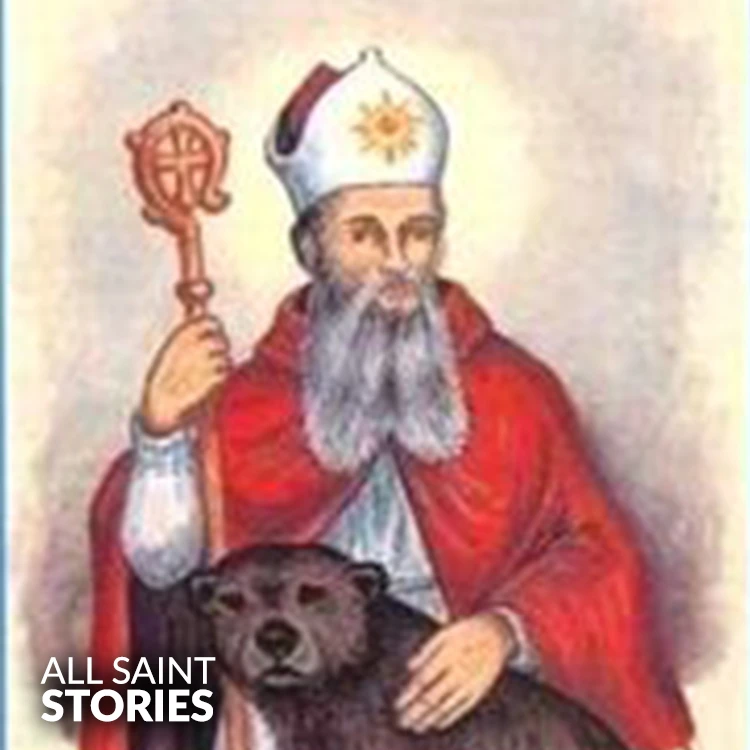"O Lord, who didst glorify Thy servant Saint Maximinus with the gift of wisdom, courage, and compassion, grant us to follow his example and to live in holiness and peace, through Christ our Lord. Amen."
ST. MAXIMINUS
ST. MAXIMINUS

St. Maximinus was the first bishop of Trier, and his legacy is closely tied to the early Christian church in Germany. Venerated as a protector of the city, he lived a life of devotion and piety. His feast day, celebrated on May 29th, honors his dedication to spreading the faith. Known for his wisdom and courage, his story continues to inspire Christians today.
Saint Maximinus of Trier, born in the early 4th century in Silly near Poitiers, France, was a prominent bishop and a steadfast defender of orthodox Christianity during a tumultuous period marked by the Arian controversy. Educated and ordained by Saint Agritius, he succeeded him as the Bishop of Trier around 332 or 335. Trier, at that time, was the administrative capital of the Western Roman Empire, positioning Maximinus in close proximity to Emperors Constantine II and Constans, which influenced his ecclesiastical and political engagements.
Maximinus is particularly noted for his unwavering opposition to Arianism, a heresy that denied the divinity of Christ. His commitment to the Nicene Creed led him to form significant alliances with other staunch defenders of the faith. In 336, he provided refuge to Saint Athanasius of Alexandria during his exile, offering him sanctuary in Trier for over two years. This act of solidarity was pivotal in maintaining the continuity of orthodox teachings amidst widespread heretical challenges.
In 341, Maximinus extended his support to Saint Paul I, the Patriarch of Constantinople, who had been deposed and exiled due to Arian pressures. Maximinus not only welcomed Paul but also played a crucial role in facilitating his return to Constantinople, thereby reinforcing the unity of the Church against Arian factions.
His influence extended to the political realm, where he actively engaged with Emperor Constans to counter Arian initiatives. In 342, when four Arian bishops from Antioch sought to sway Emperor Constans, Maximinus refused to meet with them and successfully persuaded the emperor to reject their proposals, thereby safeguarding the integrity of the Nicene faith.
Maximinus's ecclesiastical contributions include participation in significant councils aimed at addressing the Arian controversy. He was involved in the Synod of Sardica in 343, convened by Pope Julius I, and the Synod of Milan in 345. Additionally, he presided over a synod in Cologne in 346, where he deposed Bishop Euphratas for his Arian sympathies, demonstrating his commitment to upholding orthodox doctrine.
Beyond his theological endeavors, Maximinus was instrumental in the evangelization of the region. He sent missionaries, Saints Castor and Lubentius, to the valleys of the Mosel and the Lahn, furthering the spread of Christianity in the area.
Saint Maximinus's death is recorded on May 29, 352, though some sources suggest he may have died earlier, around 349. His body was initially interred in the Church of Saint John near Trier. In the 7th century, a Benedictine abbey dedicated to him was established at this site, which flourished until its dissolution in 1802.
His legacy endures as a steadfast defender of the faith, a compassionate protector of fellow bishops, and a significant figure in the early Church's efforts to preserve orthodox Christianity during a period of doctrinal strife.
Video Not Found
The information on this website is compiled from various trusted sources. While we aim for accuracy, some details may be incomplete or contain discrepancies.
If you notice any errors or have additional information about this saint, please use the form on the left to share your suggestions. Your input helps us improve and maintain reliable content for everyone.
All submissions are reviewed carefully, and your personal details will remain confidential. Thank you for contributing to the accuracy and value of this resource.
Credits & Acknowledgments
- Anudina Visudhar (Malayalam) – Life of Saints for Everyday
by Msgr. Thomas Moothedan, M.A., D.D. - Saint Companions for Each Day
by A. J. M. Mausolfe & J. K. Mausolfe - US Catholic (Faith in Real Life) – Informational articles
- Wikipedia – General reference content and images
- Anastpaul.com – Saint images and reflections
- Pravachaka Sabdam (Malayalam) – Saint-related content and insights
We sincerely thank these authors and platforms for their valuable contributions. If we have unintentionally missed any attribution, please notify us, and we will make the correction promptly.
If you have any suggestion about ST. MAXIMINUS
Your suggestion will help improve the information about this saint. Your details will not be disclosed anywhere.
© 2026 Copyright @ www.allsaintstories.com




 English
English
 Italian
Italian
 French
French
 Spanish
Spanish
 Malayalam
Malayalam
 Russian
Russian
 Korean
Korean
 Sinhala
Sinhala
 Japanese
Japanese
 Arabic
Arabic
 Portuguese
Portuguese
 Bantu
Bantu
 Greek
Greek
 German
German
 Dutch
Dutch
 Filipino
Filipino